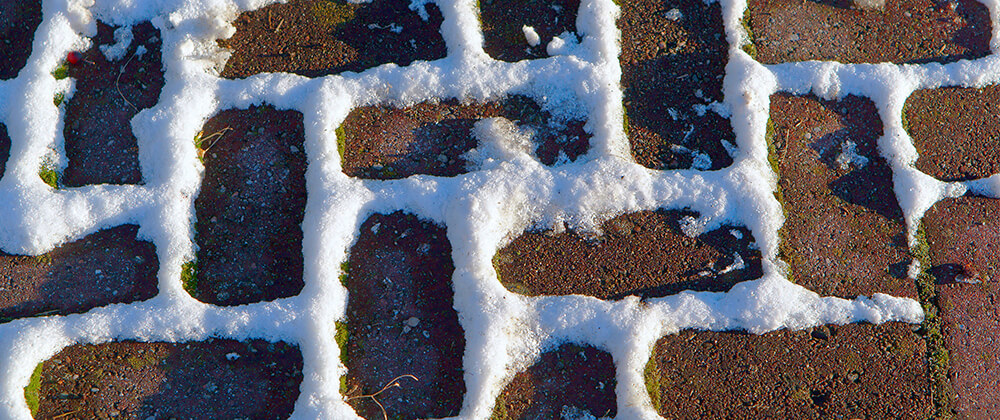Not all the white powder on your pavers is snow. The white powder that starts to show up on new concrete after a while is the result of efflorescence. The powder is harmless, but you don’t want to trap that with a sealer because it will leave your pavers looking dull and cloudy. So next summer, you should have your pavers cleaned well and get a sealing coat applied. If you use a water-based sealer, it should be reapplied every 3-5 years. If you use an acrylic sealer, it will need to be reapplied every 2-3 years. In the meantime, here’s how to protect your pavers through the winter.
Snow
Clear the snow regularly. Snow and ice buildup can cause drainage issues. You want to prevent melting snow from pooling, seeping in between pavers, or being absorbed by porous pavers and then freezing, as this can cause cracking. Luckily, if you end up with a few cracked pavers, they can easily be lifted and replaced with brand new one next spring.
Metal tools
Don’t use metal-edged shovels or scrapers. Metal may chip, scrape or scratch pavers and can also damage your sealing coat once it’s been applied. Metal edges can also leave tiny bits of metal stuck in the texture of your pavers, which can cause unsightly rust stains as well. Use a plastic shovel or, better yet, a snowblower to clear your snow.
Salt
Avoid using sidewalk salt. Instead, clear the snow and use sand for traction. Salt or magnesium-based de-icer can do a surprising amount of damage to pavers very quickly, and it will also cause premature aging of your pavers.
Dry surface
Keep your pavers dry. You don’t need to get out there with the leaf blower or a towel and make sure every paver is dry to the touch. Keeping your pavers clear of snow will allow them to dry during the day. Besides freezing and cracking, sitting water can also encourage moss and algae growth, which can also cause damage or prematurely age your beautiful new pavers.
First year care
It might seem like a fair bit of extra work for concrete; that stuff is supposed to be durable, right? It sure is, but to ensure your new hardscaping lasts as long as possible and looks its best without fading, cracking, or chipping, your pavers need a little extra TLC in the first year. When you think about how long your patio, drive, or path will last from 25-50 years, it’s really not much to ask for more frequent snow removal during that first winter.
If you really hate snow removal, there is one more option; you can have a heating system installed under your pavers. You can use either a glycol heated tubing system or electric heating cables laid underneath your pavers. This will keep your pavers clean and dry all through the New Jersey winter so that you don’t have to worry about it.
A little extra maintenance for the next few months will help keep your pavers looking great for many years to come. Protect your investment with these easy tips, and you’ll be glad you did come summer.
Contact us
At Jun’s Pro Services, we have solutions for roofing issues in Bergen County. To help you decide if our solutions are right for you, we offer free estimates throughout our New Jersey service areas. To schedule an appointment, contact Jun’s Pro Services by phone or email today!
Our experts serve all central and northern New Jersey including Bergen, Essex, Hudson, Hunterdon, Passaic, and Union Counties. We specialize in custom design. Address 55 Terrill Road, Plainfield, NJ 07062. https://junsproservices.com

